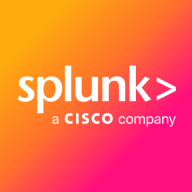

Splunk Enterprise Security and Graylog Enterprise compete in the log management and security information and event management (SIEM) markets. Based on data, Splunk might have the upper hand due to its scalability and broad integrations, while Graylog is noted for its open-source advantages and specific use case efficiency.
Features: Splunk Enterprise Security is renowned for its log management, comprehensive search via schema-on-read technology, and strong integration capabilities. It provides operational intelligence and flexibility in data handling, alongside enhanced visibility from diverse data sources. Graylog Enterprise features robust search functionalities and alerting capabilities, emphasizing its strength in managing data from various sources on an open-source platform.
Room for Improvement: Splunk Enterprise Security users seek improved visualizations and a more intuitive GUI, alongside better security administration controls. Enhancements in real-time intelligence and second-factor authentication are also desired. Graylog Enterprise needs a more user-friendly interface for complex environments and better documentation, along with increased integration capabilities for extended flexibility.
Ease of Deployment and Customer Service: Splunk Enterprise Security offers a variety of deployment options including public, private, hybrid clouds, and on-premises solutions, supported by a robust community. Users value the professional support and knowledge base, despite noted delays in response times. Graylog Enterprise, mostly deployed on-premises or in hybrid clouds, benefits from the simplicity of open-source availability, though lacks extensive support for resolving complex issues.
Pricing and ROI: Splunk Enterprise Security is perceived as high-cost, justified by its extensive features and performance in large enterprises, with substantial returns in security and operational efficiency. Graylog Enterprise appeals to budget-conscious users due to its open-source model, offering significant licensing cost savings but potentially requiring more development work for full-scale implementation.
| Product | Market Share (%) |
|---|---|
| Splunk Enterprise Security | 6.9% |
| Graylog Enterprise | 4.4% |
| Other | 88.7% |
| Company Size | Count |
|---|---|
| Small Business | 10 |
| Midsize Enterprise | 5 |
| Large Enterprise | 9 |
| Company Size | Count |
|---|---|
| Small Business | 109 |
| Midsize Enterprise | 50 |
| Large Enterprise | 264 |
Graylog Enterprise, recognized for log collection, real-time search, and enriched data handling, offers an open-source framework that integrates seamlessly with Elasticsearch. Its user-centric interface streamlines data correlation and log aggregation, supporting both backend services and comprehensive monitoring needs.
Graylog Enterprise stands out for its stability and powerful log management capabilities, facilitating efficient log aggregation, real-time updates, and data analytics. Users benefit from its plugin-based alerting, user-friendly interface, and support for microservices, including Docker integration. The ability to search in detail, flexible API integration, and data enrichment features are highly valued. Challenges include collector application issues, desired visualization enhancements, and authentication integration improvements. Users seek advancements in UI customization, backup functions, and easier rule creation.
What are Graylog Enterprise's most important features?In industrial use, Graylog Enterprise is crucial for audit trailing in financial sectors, facilitating security event identification and error monitoring. Backend teams leverage real-time analytics for swift issue resolution, while developers appreciate the comprehensive log visualization enabled by Docker integration for microservice management.
Splunk Enterprise Security delivers powerful log management, rapid searches, and intuitive dashboards, enhancing real-time analytics and security measures. Its advanced machine learning and wide system compatibility streamline threat detection and incident response across diverse IT environments.
Splunk Enterprise Security stands out in security operations with robust features like comprehensive threat intelligence and seamless data integration. Its real-time analytics and customizable queries enable proactive threat analysis and efficient incident response. Integration with multiple third-party feeds allows detailed threat correlation and streamlined data visualization. Users find the intuitive UI and broad compatibility support efficient threat detection while reducing false positives. Despite its strengths, areas such as visualization capabilities and integration processes with cloud environments need enhancement. Users face a high learning curve, and improvements in automation, AI, documentation, and training are desired to maximize its potential.
What Are the Key Features of Splunk Enterprise Security?In specific industries like finance and healthcare, Splunk Enterprise Security is instrumental for log aggregation, SIEM functionalities, and compliance monitoring. Companies leverage its capabilities for proactive threat analysis and response, ensuring comprehensive security monitoring and integration with various tools for heightened operational intelligence.
We monitor all Log Management reviews to prevent fraudulent reviews and keep review quality high. We do not post reviews by company employees or direct competitors. We validate each review for authenticity via cross-reference with LinkedIn, and personal follow-up with the reviewer when necessary.